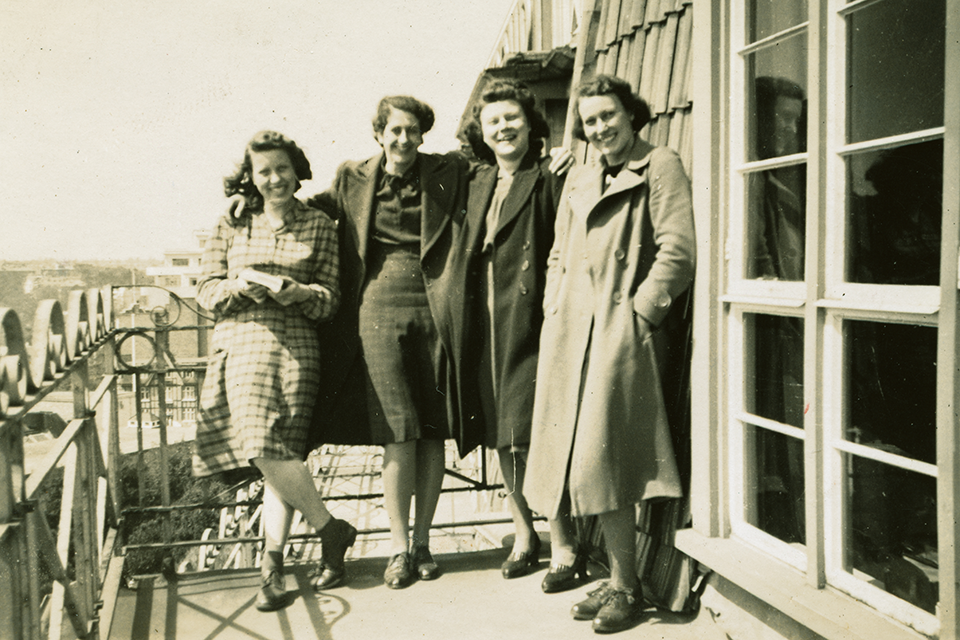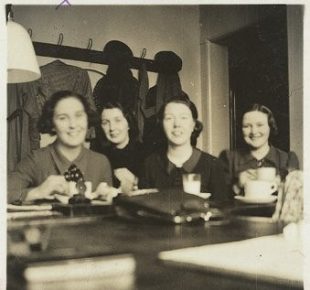
With International Women’s Day just around the corner, we want to take a moment to remember the astonishing women who changed the gender landscape of our workplace and celebrate being part of an inclusive organisation that continues to support equality.
The first women of HM Land Registry were recruited shortly after we received our first typing machines back in 1899. Our amateur historian Peter Mayer tracked down records from the 1901 census where 18-year-old Helen Louisa Marie Robey and 25-year-old Mary Beatrice George both listed their occupation as ‘typist’.
The women of HM Land Registry have been blazing a trail ever since. We found the story of Janetta Scorer in the National Archives. Janetta was one of the women recruited to draw maps back in the 1930s. Some male co-workers at the time were not supportive, but the Chief Land Registrar told them: "Women were competing with men in all professions and they must be prepared for women in the Mapping Branch!"

We also found the story of (Edith) Mary Price, one of the first women to break through the ‘glass ceiling’, becoming a Deputy Chief Land Registrar back in the 1950s. She was a campaigner for equality and equal pay for women, and for several years she was chair of the Council of Women Civil Servants. Mary was awarded the British Empire Medal, recognising her service as a nursing volunteer during the war, and in 1956 she was also awarded a CBE (Commander of the Order of the British Empire) in the Queen’s Birthday Honours.
------------------------------
Our Women’s Network members are proudly following in the footsteps of all the influential women before them. We asked them to share some of their own stories about helping to break barriers in the workplace.
Menopause, HM Land Registry and me…
Lisa Faulkner, caseworker and co-chair of the Women's Network
Coping with menopausal symptoms at work can be tough. There are days when I feel I have no idea what I am doing, even after 31 years’ service! Some days all I want to do is cry or sleep (or both!) and it’s all coupled with a severe lack of self-esteem.
I’m not alone. Three out of five (59%) working women between the ages of 45 and 55 who are experiencing menopause symptoms say it has a negative impact on them at work.
At HM Land Registry we’ve been doing a lot of work recently to support the specific needs of women affected by the menopause. We’ve held educational workshops and we have online and local support groups. It really helps to have other women sharing their symptoms, treatments and advice. We’ve also had some male colleagues join us to find out how they can support the women in their life, at work or at home.
The support I receive from my colleagues and line manager is immense. They really make sure I feel valued for who I am and what I do.
One in 4 women will experience the debilitating mental and physical symptoms of menopause. These can last for up to 15 years. I come to work happy knowing that HM Land Registry is creating a supportive culture with the right attitudes towards this issue.
Support for parents returning to work
Sophie Gordon, caseworker and Women’s Network rep for Nottingham Office
Returning to work after having a baby can be an emotional time for parents. It may be the first time you’ve been separated from your baby for long periods.
Earlier this year I was approached by a colleague who felt we could offer additional support for mums who want to continue breastfeeding and need to express breast milk at work. Our policy promoted the use of the first aid rooms in our offices but these weren’t ideal as you could be disturbed if there was a medical emergency. We wanted to make sure parents had somewhere that was private, hygienic and comfortable to express and store milk.
I worked with Amy Bradshaw, another Women’s Network rep, and we put together a business case for improved support and resources for breastfeeding parents.
Mums can now use the prayer or health and wellbeing rooms in our offices to express milk. Our Faith and Belief Network helped us put together a schedule of the monthly prayer times which has helped people to find a quiet time to use the shared space.
We’ve also worked hard to make sure the rooms are secure and private with sufficient blinds and locks. In every office you have also got access to a clean fridge so you can store any expressed breast milk. Our next step is going to be a guide for mums and dads about to go on parental leave, letting them know about all the support HM Land Registry offers and the family-friendly policies that help you balance the demands of a family and a career.
An NCT Survey found that one in three women (39%) find it difficult or very difficult to return to work after maternity leave and 15% feel it might be tricky to continue breastfeeding. As a network and as an organisation we will continue to remove barriers, looking for ways to support new parents better.
Fertility in the workplace
Steph Phipps, Technical Team Lead in IT Operations and co-founder of the Women’s Network
One in 6 couples are affected by infertility and yet it is something most of us don’t understand. It was to me – until my husband and I joined the 1 in 6…
When I found myself having to undertake fertility treatment in 2016, I felt really lucky to work at HM Land Registry. I’d heard lots of horror stories online of people feeling like they couldn’t tell their workplace about their treatment, or that their bosses weren’t allowing them to attend appointments.
Many of the roles at HM Land Registry offer flexible working, so I could vary my start, finish and break times to attend appointments. I also work in a job where I’m able to work from home. I was supported every step of the way, from managing sick leave when I had to recover from medical procedures, to the tremendous support and positivity from my work ‘family’ to get me through it all – for this I’ll be forever grateful.
Our beautiful baby boy arrived in April 2018, a result of IVF (in vitro fertilisation). Since then I’ve been raising awareness across our organisation, sharing my fertility journey and guidance. I’ve also joined a cross-government group intent on influencing policy, to help understand and support others going through fertility treatment.
The HM Land Registry Women’s Network are excited to be hosting a cross-government event to celebrate International Women’s Day in Nottingham on 9 March.
We’re currently recruiting for a range of jobs including Digital, Data and Technology specialists. To find out more visit our Civil Service careers site or search for #WeAreHMLR on Twitter, Facebook or LinkedIn.